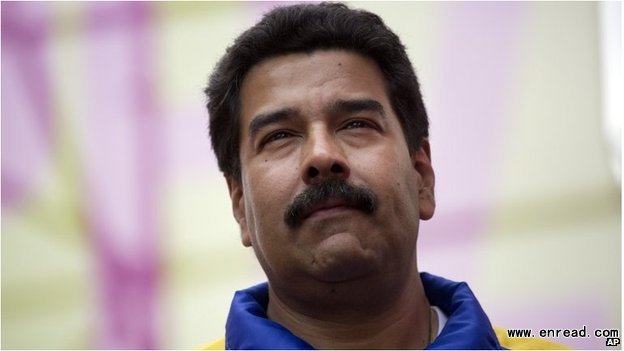| ||||||||||||||||||||||||||||||||||||||||||||||||||||||||||||||||||||||||||||||||||||||||||||||||||||||||||||||||||||||||||||||||||||||||
|
The United States has expelled three Venezuelan diplomats1, in response to the expulsion of three of its own consular2 officials from Caracas.
美国将三位委内瑞拉外交官驱逐出境,作为对加拉加斯驱逐其三位领事事件的回应。
 conspiring3 with students who led protests" style="cursor:pointer" onclick="window.open('/upimg/allimg/140226/1_140226080417_1.jpg')" /> conspiring3 with students who led protests" style="cursor:pointer" onclick="window.open('/upimg/allimg/140226/1_140226080417_1.jpg')" />President Nicolas Maduro accused US consular officials of conspiring with students who led protests Just over a week ago, Venezuela had accused the expelled Americans of having links with violent groups.
President Obama said the claims were baseless and false.
At least 13 people have been killed during weeks of protests in Venezuela, although the opposition4 puts the number of dead at 15.
The US State Department said Ignacio Luis Cajal Avalos, Victor Manuel Pisani Azpurua, and Marcos Jose Garcia Figueredo were considered "personae non-gratae" and had 48 hours to leave the country.
On 16 February, Venezuela said it was expelling three US diplomats for allegedly meeting students who had been involved in violent marches.
But the US State Department soon rejected the accusations5 in an official press statement, followed by remarks by the President, Barack Obama.
He told reporters after a meeting in Mexico that Venezuela had been "making up false accusations" and that the government of President Nicolas Maduro should focus on the "legitimate grievances(抱怨,不平) of the Venezuelan people."
Consular officials Breann Marie McCusker, Jeffrey Gordon Elsen and Kristopher Lee Clark were accused of meeting students in private universities in the last two months.
Washington's diplomatic reprisal8(报复) came on the same day the Venezuelan government named a new ambassador to the US.
Foreign Minister Elias Jaua said the move illustrated9 Caracas' willingness to maintain a political and diplomatic rapport10 with Washington, reports BBC Mundo's Thomas Sparrow in Washington.
On Tuesday, Mr Jaua said Mr Maduro had named Maximilian Arvelaez as the country's new envoy11 to the US. Mr Arvelaez was previously12 the ambassador to Brazil.
The recent unrest started in Tachira and the neighbouring state of Merida, when students took to the streets, angered by Venezuela's high crime rate and economic woes13, including record inflation and shortages of some staples14.
But the government has blamed the shortages on "saboteurs" and "profit-hungry corrupt15 businessmen".
President Maduro accused opposition leader Leopoldo Lopez of inciting16 violence, but his arrest triggered further demonstrations17.
The government blames Mr Lopez for the unrest and accuses him of conspiring against the government with the US Central Intelligence Agency (CIA).
There have also been large rival demonstrations by supporters of the government.
President Maduro has called for a "national peace conference" to be held on Wednesday.
点击  收听单词发音 收听单词发音
|
||||||||||||||||||||||||||||||||||||||||||||||||||||||||||||||||||||||||||||||||||||||||||||||||||||||||||||||||||||||||||||||||||||||||
上一篇:尼日利亚一所学校遭袭 29人死亡 下一篇:美俄就乌克兰危机举行重要会谈 |
||||||||||||||||||||||||||||||||||||||||||||||||||||||||||||||||||||||||||||||||||||||||||||||||||||||||||||||||||||||||||||||||||||||||
TAG标签:
government
Obama
Venezuela
- 发表评论
-
- 最新评论 进入详细评论页>>



